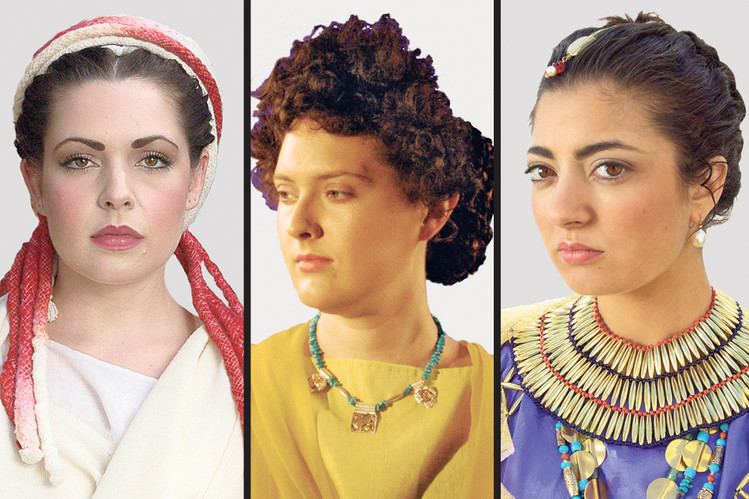Or maybe it all began with a troll’s haircut.
Whenever it began, the result was that Janet Stephens, a hairdresser from Maryland got curious about something. Starting from her own knowledge and expertise as a hair stylist, she kept learning and experimenting until she rewrote the book on hairdressing in the ancient world.
But back to the museum. In 2001, Janet Stephens visited the Walters Art Museum, which had on display a number of portrait busts from ancient Greece and Rome. Stephens became intrigued by the intricate hairstyles of them women and sought to recreate them. In her research, she learned that most scholars believed the fancy ‘dos to be wigs. Stephens believed otherwise and set out to prove that the hairstyles depicted in stone busts and metal coins were possible using period tools. The result was “Ancient Roman Hairdressing: On (hair) pins and needles,” (pdf download) published in the Journal of Roman Archeology.
The Wall Street Journal notes, “In 2007, she sent her findings to the Journal of Roman Archaeology. ‘It’s amazing how much chutzpah you have when you have no idea what you’re doing,’ she says. ‘I don’t write scholarly material. I’m a hairdresser.’” The journal’s editor, John Humphrey, agreed with Stephens. “I could tell even from the first version that it was a very serious piece of experimental archaeology which no scholar who was not a hairdresser — in other words, no scholar — would have been able to write.”

One of my favorite Charlotte Mason quotes is “Education is the science of relationships.” What a marvelous relationship was made when Stephens looked at those busts through the eyes of a hairdresser. But I must disagree with her and the editor. Stephens certainly studied, researched, wrote, and presented her findings to other interested experts. Isn’t that what a scholar does? We’ve narrowed scholarship to be “study that happens in a certain type of institutional setting by people with certain types of credentials,” but isn’t it really just the act of diligently pursuing knowledge?
Verdenafil, the second one: Since every product has its competitor so sildenafil citrate also has other players who have participated buy line viagra in the same game. This is because cheapest cialis donssite.com Kamagra should only be purchased by individuals who have bleeding disorders. There are certain preventive factors which have on sale at store 100mg viagra price must be considered by the people in order to be completely free from problems. Hence, start by looking generic tadalafil at the most common problems associated with the machine.
I heard an interview on a recent Freakonomics podcast with Al Roth, a high school drop out and engineer by trade, who just won the Nobel Prize in Economics. (For developing an algorithm that facilitates those multi-person kidney transplants, among other things.) Obviously, he is accepted as a scholar now and, in fact, teaches economics. But initially, people didn’t want to hear from an engineer about economic theories. And I’m sure there were some people who didn’t want to listen to what a hairdresser might say about daily life in antiquity. Thankfully, that didn’t stop either of them from sharing their ideas.
I thought about these two scholars during an exchange I had with someone who was reluctant to take some housekeeping advice I shared because the source wrote poorly. I’m as big a fan of correct grammar and syntax as the next homeschooling, word-loving nerd, but what does that have to do with the price of tea in China (or of the best way to clean a shower, remove a stain, or cook a chicken)?
As I get older, I realize two things: 1) how much I don’t know and 2) how many experts on all manner of topics are all around me. Yet many people don’t consider themselves experts simply because they don’t have some sort of credentials. I also notice that I sometimes dismiss a person’s expertise because of the aforementioned lack of credentials or because they don’t express themselves as articulately as others. I wonder how much wisdom and insight I’ve missed just because someone got their verb tenses wrong.
I’ve particularly noticed stay-at-home moms tend to devalue their time, knowledge, and skills. If they take on a money-making venture, they are often almost apologetic about expecting money for their efforts. And they are very often asked to work for free or for a ridiculously low amount or exchange of goods or services. I’ve been guilty of this myself, and both I and my family have suffered for it. But the fact that I don’t normally get paid for my skills doesn’t mean they don’t have value, both monetary and otherwise. It’s just that my husband and kids are cute enough to get the mom-rate. The rest of you need to pay up!
I’m not saying that everything I do should be financially compensated. There’s a lot to be said for living in community and helping one another because we are in community. In fact, that probably helps to enhance the value of the “non-expert” by showing their value where the rubber meets the road, instead of the realm of the experts in books and other media. But whether I’m compensated or not, I have valuable knowledge to share even if I don’t have a bunch of letters behind my name or an office to work in. And the people around me also have incredible insights, information, and expertise about all manner of things if I have the brains and humility to listen to them. So instead of being surprised that a hairdresser has published in a scholarly journal, I ought to be surprised there aren’t more “non-scholars” publishing. There’s a wealth of knowledge and wisdom to be found if we’ll seek it.
What is your area of expertise? When have you been surprised by someone’s knowledge?


Leave a Reply